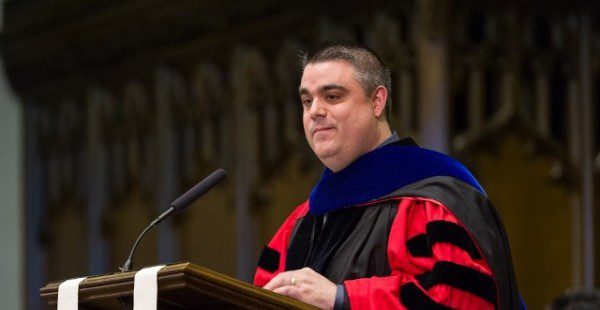As much of the American church continues to decline (especially mainline Protestantism and now also conservative (white) evangelicalism) and as the “nones” and “dones” increase by leaps and bounds, particularly among millennials, major questions  loom for institutions in these circles. Fewer people means less money, less money means fewer jobs, fewer jobs means declining human resources (and therefore less creativity and energy) to “right the ship.” Many seminaries are experiencing the implications of the dramatically changing landscape. Some are trying their best to adjust expectations and to creatively and constructively adapt to the change. They can do this by shortening curriculum (and therefore lowering cost to students), by revising marketing strategies, by seeking out creative partnerships, etc. Others are simply doubling-down on what they’ve always done: pushing harder for donations, marketing the same but more intensely, trying to be even better at academic theology, practical ministry skills, traditional pedagogy, and so on. But for these institutions to survive, must less thrive, into the uncertainty of the looming future, I wonder if something deeper and more fundamental is needed. We might need to think again about the nature of ministry itself.
loom for institutions in these circles. Fewer people means less money, less money means fewer jobs, fewer jobs means declining human resources (and therefore less creativity and energy) to “right the ship.” Many seminaries are experiencing the implications of the dramatically changing landscape. Some are trying their best to adjust expectations and to creatively and constructively adapt to the change. They can do this by shortening curriculum (and therefore lowering cost to students), by revising marketing strategies, by seeking out creative partnerships, etc. Others are simply doubling-down on what they’ve always done: pushing harder for donations, marketing the same but more intensely, trying to be even better at academic theology, practical ministry skills, traditional pedagogy, and so on. But for these institutions to survive, must less thrive, into the uncertainty of the looming future, I wonder if something deeper and more fundamental is needed. We might need to think again about the nature of ministry itself.
In the seminal book, Misisonal Church: A Vision for the Sending of the Church in North America, a team of writers associated with the “Gospel and Our Culture Network” suggested this very thing–back in 1998. The challenge feels like a prophetic word to a situation that now demands an even more urgent response. They argue that the (present) model of ministry as “professional” is unraveling with the dismantling of Christendom. In Christendom, they say,
Religion represented a positive science, and this positivist knowledge formed the basis for educating a professional clergy for tasks and responsibilities within the religious culture of a fading Christendom. This educational paradigm has continued into the twentieth century; seminary training remains firmly committed to the model of preparing a professional clergy for a set of tasks considered to be ‘ministry’…Moreover, across the varieties of today’s models of ministry, there remains this underlying notion of church leadership functioning as activist, the megachurch entrepreneur, or the therapist-pastor, all are seen to require some aspect of professionalized training (195).
But as the authors point out, in a declining Christendom, there is decreasing demand for professional ministers to lead its institutions in traditional, salaried roles. This will at one level require an elevation of the role of the laity–if not a complete challenge to the laity-clergy distinction. But this change could (happily, in my view) return the Protestant church back to its “priesthood of all believers” roots. The decentering of authority could also awaken a new sense of community and participation in the church’s mission.
As a theology professor in a seminary (one which, I would add, is passionate about addressing this very problem and embracing it as an opportunity), I am of course biased, but I am convinced of the continuing need for serious, reflective theological education. But that theological education needs to be attuned to issues of context, it needs to uphold the “public” and missional nature of theology as a primary aspects, and the pedagogy must be grounded in praxis as much as in theory. In my view, the “pastor” of the coming age will be a contextual theologian who is adept at leading a community of people through mission in a changing, dynamic context.
Obviously this barely scratches the surface, so I would be happy for you, my dear readers, to fill in the blanks…











